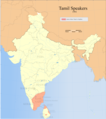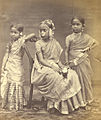The Tamils portal
The Tamils (/ˈtæmɪlz, ˈtɑː-/ TAM-ilz, TAHM-), also known as the Tamilar, are a Dravidian ethnolinguistic group who natively speak the Tamil language and trace their ancestry mainly to India's southern state of Tamil Nadu, to the union territory of Puducherry, and to Sri Lanka. The Tamil language is one of the world's longest-surviving classical languages, with over 2000 years of Tamil literature, including the Sangam poems, which were composed between 300 BCE and 300 CE.
Tamils constitute 5.9% of the population in India (concentrated mainly in Tamil Nadu and Puducherry), 15% in Sri Lanka (excluding Eelam Moors), 7% in Malaysia, and 5% in Singapore. From the 4th century BCE, urbanisation and mercantile activity along the western and eastern coasts of Tamilakam -- what is today Kerala and Tamil Nadu -- led to the development of four large Tamil empires, the Cheras, Cholas, Pandyas, Pallavas, and velirs and a number of smaller states, all of whom were warring amongst themselves for dominance. The Jaffna Kingdom, and vanni chieftaincies inhabited by Eelam Tamils, was once one of the strongest kingdoms of Sri Lanka and controlled much of the north of the island. (Full article...) Selected article -The Portuguese conquest of the Jaffna kingdom occurred after Portuguese traders arrived at the rival Kotte kingdom in the southwest of modern Sri Lanka in 1505. Many kings of Jaffna, such as Cankili I, initially confronted the Portuguese in their attempts at converting the locals to Roman Catholicism, but eventually made peace with them. By 1591, the king of Jaffna Ethirimanna Cinkam was installed by the Portuguese. Although he was nominally a client, he resisted missionary activities and helped the interior Kandyan kingdom in its quest to get military help from South India. Eventually, a usurper named Cankili II resisted Portuguese overlordship only to find himself ousted and hanged by Phillippe de Oliveira in 1619. The subsequent rule by the Portuguese saw the population convert to Roman Catholicism. The population also decreased due to excessive taxation, as most people fled the core areas of the former kingdom. (Full article...)General imagesSelected biography -Navanethem "Navi" Pillay (born 23 September 1941) is a South African jurist who served as the United Nations High Commissioner for Human Rights from 2008 to 2014. A South African of Indian Tamil origin, Pillay was the first non-white woman judge of the High Court of South Africa. She has also served as a judge of the International Criminal Court and President of the International Criminal Tribunal for Rwanda. Her four-year term as High Commissioner for Human Rights began on 1 September 2008 and was extended an additional two years in 2012. In September 2014 Prince Zeid bin Ra'ad succeeded her in her position as High Commissioner for Human Rights. In April 2015, Pillay became the 16th Commissioner of the International Commission Against the Death Penalty. She is also one of the 25 leading figures on the Information and Democracy Commission launched by Reporters Without Borders. Pillay was born and raised in Durban, South Africa where she later attended the University of Natal, receiving her Bachelor of Arts in 1963 and her Bachelor of Law in 1965. After university, Pillay pursued a career as an attorney and served under criminal defense attorney N.T. Naicker, joining the legal defense against apartheid. In 1967, Pillay started her own law firm and became the first woman to do so in her home province of Natal. In 1981, Pillay applied to and attended Harvard University under the foreign exchange Harvard-South Africa Scholarship Program and earned her Master of Law. In 1988, she completed her thesis and graduated from Harvard Law School with a Doctorate of Jurisprudence. (Full article...)CategoriesTopicsTamil People Countrywide: India • Sri Lanka • Canada • Malaysia • Singapore • South Africa • England Related Ethnic Groups: Brahui • Gond • Kannadiga • Khonds • Kodava • Oraon • Malayali • Telugus • Tuluvas Related indigenous Groups: Badagas • Toda • Kuruba
See also: List of Tamil people, Tamil script, Tamil Script Code for Information Interchange Related portalsWikiProjectsThings to do
Associated WikimediaThe following Wikimedia Foundation sister projects provide more on this subject:
Discover Wikipedia using portals |
© MMXXIII Rich X Search. We shall prevail. All rights reserved. Rich X Search
































































